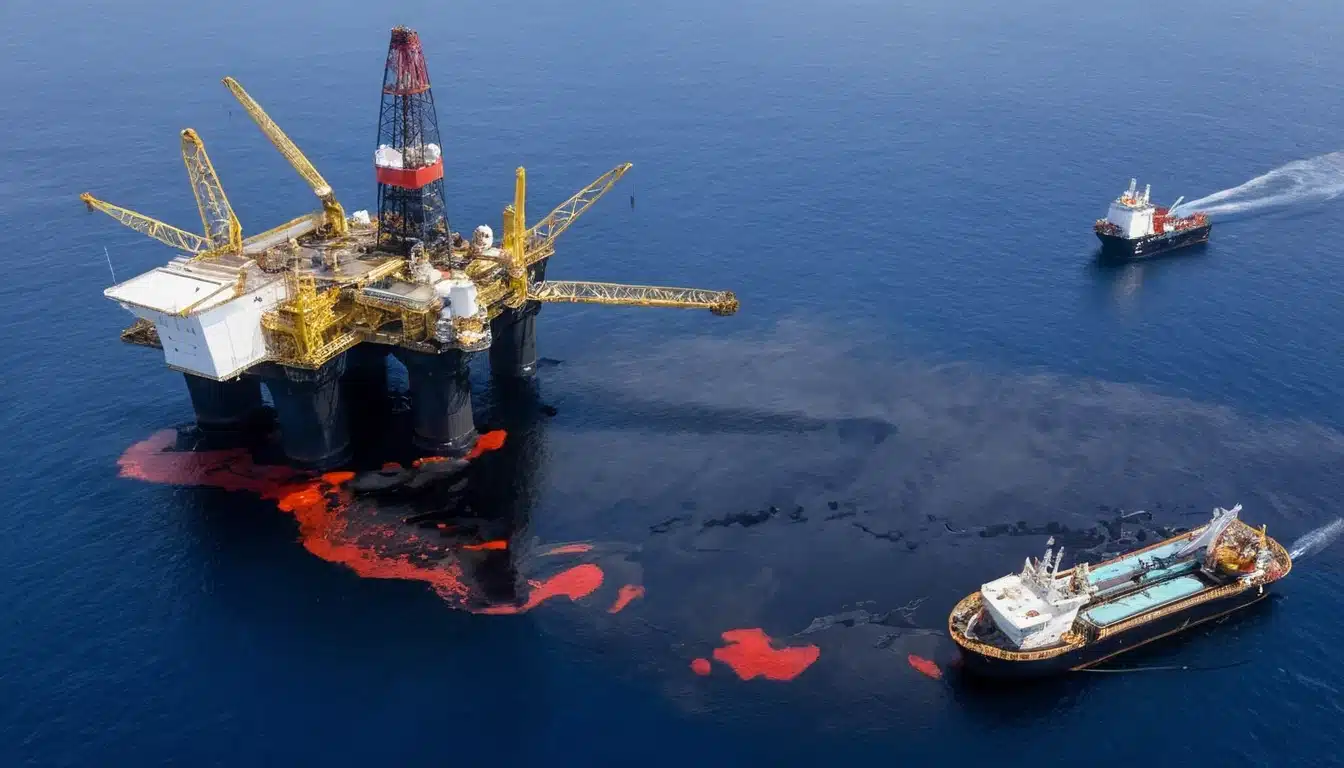Masterclass in International Oil and Gas Business Management

| No upcoming Schedule available for this course. | Register |
|---|---|
| Take control of your schedule! Choose your preferred dates and locations. click the register button. | Register |
| No upcoming Schedule available for this course. | Register |
|---|---|
| Take control of your schedule! Choose your preferred dates and locations. click the register button. | Register |
Did you know that in 2023, ExxonMobil, together with Hess and Cnooc, invested more than £55 billion in one project: the Stabroek Block offshore oil development in Guyana? This compelling statistic underscores the critical importance of expert training in international oil and gas business management.
Course Overview
The Masterclass in International Oil and Gas Business Management is meticulously designed to equip professionals with cutting-edge knowledge in business strategy, leadership in oil and gas, and industry regulations. This course focuses on financial and technical management, economics of gas processing operations, and key contractual issues to ensure participants can effectively navigate the complex landscape of global energy markets.
Why Select This Training Course?
Selecting this International Oil and Gas Business Management Course offers numerous advantages for professionals involved in petroleum industry and supply chain management. Participants will gain advanced knowledge of commercial agreements, dispute management, and investment analysis. The course provides hands-on experience through practical sessions and professional development opportunities, enabling attendees to optimise their corporate relationships effectively.
For organisations, investing in this training enhances overall operational efficiency and strengthens business strategy. By ensuring that personnel are well-trained in oil and gas project management, organisations not only protect their assets but also build sustainable practices. Research shows that companies implementing comprehensive management strategies can significantly improve performance. For instance, Seplat’s strategic acquisition of ExxonMobil’s assets for £1.28 billion demonstrated how effective business management can lead to controlling 16% of Nigeria’s production capacity.
Individuals who complete this course will benefit from enhanced career prospects as they become more valuable assets in their respective fields. The skills acquired through this training can lead to professional growth and increased responsibilities within their organisations. Studies indicate that with CNPC’s strategic revival in international dealmaking, particularly in LNG and offshore drilling, the demand for skilled oil and gas management professionals continues to rise.
Elevate your management capabilities – Join our next session!
Who is this Training Course for?
This course is suitable for:
- Managers and executives in oil and gas companies.
- Business analysts focused on the energy sector.
- Project managers in upstream, midstream, or downstream operations.
- Professionals in energy policy and regulation.
- Entrepreneurs looking to venture into oil and gas markets.
What are the Training Goals?
The objectives of this training course are to enable professionals:
- To master strategic business management in the international oil and gas industry.
- To leverage modern technology for competitive advantage.
- To navigate global regulatory environments and compliance.
- To drive sustainability and efficiency in oil and gas operations.
How will this Training Course be Presented?
The International Oil and Gas Business Management Course employs a comprehensive and innovative approach to ensure maximum knowledge retention and skill development. Expert-led instruction from seasoned industry professionals forms the core of the course, providing up-to-date insights into modern business management techniques and practical applications for today’s energy sector.
Our training methodology includes:
- Interactive sessions with industry veterans
- Case study analysis of successful business strategies
- Practical workshops on contract negotiations
- Group projects focused on investment analysis
- Access to extensive industry resources and networks
Ready to master oil and gas business management? Secure your spot today!
Course Syllabus
Module 1: Global Oil and Gas Market Dynamics
- Market segmentation and product differentiation.
- Influence of technology on market trends.
- Energy transition and its impact on traditional markets.
- Trading strategies in oil and gas.
- Economic cycles in the energy sector.
- Forecasting demand and supply.
- Competitive analysis in the international scene.
- Regulatory frameworks affecting market access.
Module 2: Strategic Business Planning
- Developing vision and mission for energy companies.
- Strategic analysis tools like SWOT and PESTEL.
- Long-term vs. short-term strategy in oil and gas.
- Resource allocation for maximum return on investment.
- Mergers, acquisitions, and strategic partnerships.
- Diversification strategies beyond hydrocarbons.
- Risk management in project and portfolio planning.
- Capital budgeting for exploration and development.
- Scenario planning for market disruptions.
- Aligning business strategy with sustainability goals.
Module 3: Financial Management in Oil and Gas
- Financial structures unique to the energy industry.
- Cost management in exploration and production.
- Managing cash flow in volatile markets.
- Funding models for new ventures or expansions.
- Financial performance metrics for oil and gas.
- Debt management and financial restructuring.
Module 4: Operations Management and Optimization
- Lean management in oil and gas operations.
- Supply chain optimisation for energy companies.
- Production scheduling and maintenance planning.
- Asset management and performance optimisation.
- Integration of IoT in operational control.
- Automation in drilling and refining processes.
- Safety management systems in operations.
- Efficiency in logistics and transportation.
- Quality control in refining and distribution.
- Continuous improvement in operational practices.
- Resource management during operational changes.
- Environmental impact reduction strategies.
Module 5: Oil and Gas Law and Regulatory Compliance
- Understanding international energy law.
- Compliance with health, safety, and environmental regulations.
- Licensing, permits, and contractual obligations.
- Dispute resolution in international contexts.
- Anti-corruption and ethical business practices.
- Navigating local content laws.
- Compliance with trade sanctions.
- Regulatory impact on business strategy.
- Legal risk management.
Module 6: Project Management in Oil and Gas
- Project lifecycle in exploration and development.
- Scope, time, and cost management in projects.
- Risk assessment and mitigation in project execution.
- Resource planning for project success.
- Project scheduling with modern tools.
- Change management during the project lifecycle.
- Quality assurance in project deliverables.
- Project closeout and lessons learned.
- Agile methodologies in oil and gas projects.
Module 7: Technology and Innovation
- Digital transformation in oil and gas operations.
- AI and machine learning applications in energy.
- Blockchain for supply chain transparency.
- Cybersecurity in oil and gas infrastructure.
- Big Data analytics for strategic decisions.
- IoT for real-time operational data.
- Innovations in drilling and exploration tech.
- Sustainable technology for cleaner operations.
- Technology in carbon management.
- Protecting innovation through patents and trademarks.
Module 8: Leadership and Organizational Culture
- Leadership styles in high-risk industries.
- Managing diverse teams across global operations.
- Fostering innovation through leadership.
- Change management in a traditional sector.
- Ethical leadership in the energy sector.
- Developing a culture of safety and compliance.
- Talent management and succession planning.
- Communication strategies in crisis management.
- Leadership in driving environmental stewardship.
- Building resilience in leadership teams.
Module 9: Environmental Management and Sustainability
- Principles of sustainable oil and gas operations.
- Carbon footprint reduction strategies.
- Water management in oil and gas activities.
- Renewable energy integration in traditional operations.
- Life cycle assessment of oil and gas products.
- Environmental impact mitigation practices.
- Compliance with global environmental standards.
- Strategies for reducing emissions.
- Waste management and recycling in operations.
- Biodiversity conservation in operational areas.
Module 10: International Negotiations and Contracts
- Negotiation tactics for international deals.
- Structuring complex oil and gas contracts.
- Joint ventures and partnership agreements.
- Dispute avoidance and resolution mechanisms.
- Cultural nuances in international negotiations.
- Managing multi-party negotiations.
- Legal frameworks for international contracts.
- Contract management and compliance.
- Renegotiating contracts in changing conditions.
- Ethical considerations in contract negotiations.
Module 11: Human Resources and Workforce Development
- Workforce planning in a cyclical industry.
- Training and development for technical skills.
- Managing expatriate and local talent.
- Health and safety training for oil and gas workers.
- Performance management in challenging environments.
- Diversity and inclusion in the energy sector.
- Employee engagement and motivation strategies.
- Managing remote and offshore teams.
- Succession planning for critical roles.
- Continuous learning culture in the industry.
Training Impact
Research indicates that organisations implementing structured oil and gas business management training programmes have demonstrated measurable benefits in both strategic planning and operational efficiency. Case studies highlight the following improvements from our key industry partners:
From ExxonMobil’s Guyana operations:
- Strategic investment yielding potential returns exceeding £100 billion
- Enhanced project management capabilities
- Strengthened international business relationships
Transform your career in international oil and gas business management – Enrol now!








